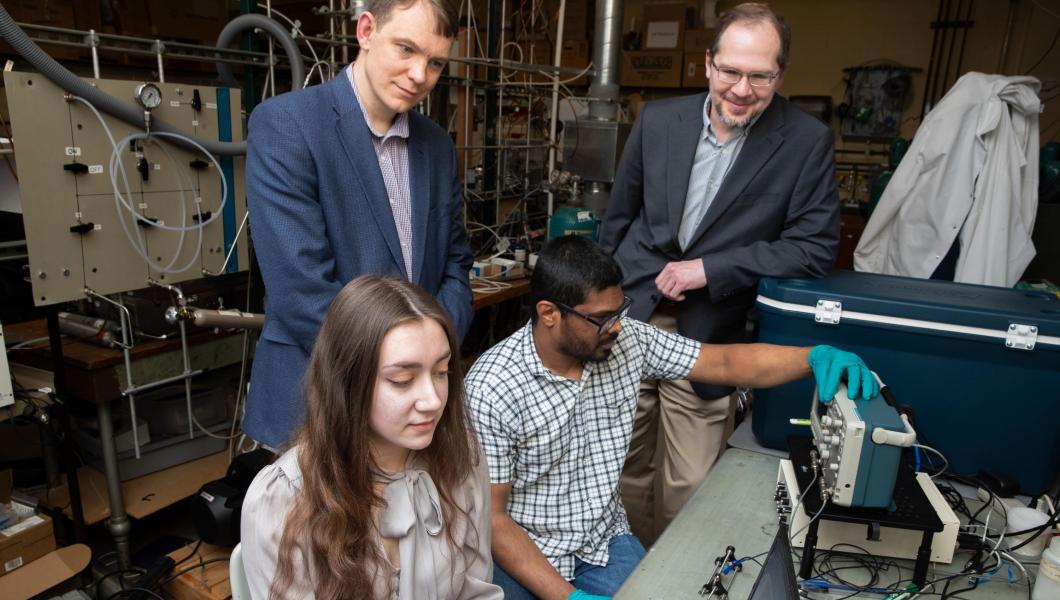NJIT Researchers Ready Follow-Up Investigation Bound for Int'l Space Station

NJIT researchers will look to continue a successful string of space-bound studies at the International Space Station (ISS) when a new payload of experimental samples launches to the station with the SpaceX CRS-20 commercial cargo resupply mission on Mar. 7.
NJIT’s Boris Khusid, professor of chemical and materials engineering, and Lou Kondic, Distinguished Professor of Applied Mathematics, will join researchers from NASA, New York University and Streamline Automation in conducting a set of experiments, titled “ACE-T-Ellipsoids”, at the ISS to explore the fundamental science of colloidal particles — microscopic “building block” particles for materials on Earth that are key to the composition of everything from milk and tea to household electronics and 3D printing technology.
Launch of the ACE-T-Ellipsoids experiments will follow the successful recent launch of the ACE-T11 experiments to explore colloids at the ISS. Both investigations, led by Khusid, seek to uncover new core details about the behavior and density of colloidal particles as they self-organize to form various suspended arrangements under experimentally controlled temperatures, unperturbed by the influence of gravity in spaceflight conditions.
Findings from the research could advance the use of colloidal particles in the engineering of everything from additive manufacturing technology to new optical devices and stretchable electronics.
Khusid joined NASA’s live media teleconference to highlight the team’s upcoming investigation for the public on Feb. 20. NASA's dial-in audio replay of the teleconference is available at: 1-800-677-0672
“Despite numerous experimental studies on Earth, we still do not know how to control [colloidal] particle arrangement with respect to each other due to ubiquitous gravity, “ said Khusid, the study’s principal investigator. “By performing the ACE-T Elliptical experiments under microgravity in the ISS, [we] hope to see the pure colloid formation process in action and learn how to manipulate it to create the next generation of materials with properties tuned to applications that will improve both our lives on Earth and the success of long-range spaceflight missions.”
Remotely operated from the NASA Glenn Center Control Room, both the ACE-T11 (involving sphere-shaped colloidal particles) and ACE-T-Ellipsoids (ellipsoidal-shaped particles) experiments will apply high-resolution imaging to capture the colloid formation process over time as temperature is experimentally altered in the station’s microgravity environment. The ACE-T-Ellipsoids experiments will study the complex manner in which colloidal elliptical particles of less circular symmetry periodically arrange under these varying temperatures.
“We want to learn how periodic arrangement is formed,” said Khusid. “Comparing the outcome of ACE-T11 experiments on spherical particles and ACE-T Ellipsoids experiments on elliptical particles would reveal the hidden interrelation between processes driving orientation and periodicity in particle arrangement.”
The Mar. 7 launch at 11:49 pm EST will take place aboard the Dragon spacecraft on a Falcon 9 rocket from Space Launch Complex 40 at Cape Canaveral Air Force Station in Florida. Both the ACE-T11 and ACE-T-Ellipsoids experiments will be carried out at the ISS later this year.
The live launch can be seen at: http://www.nasa.gov/live
Learn more about the coming ACE-T-Ellipsoids experiments, as well as other highlighted experiments that will be carried aboard the SpaceX CRS-20 mission to the International Space Station, here.
For more information on the SpaceX resupply mission in general, visit: https://www.nasa.gov/spacex.
...
This project is part of joint activity of NASA's Division of Space Life and Physical Sciences Research and Applications and the National Science Foundation's Particulate and Multiphase Processes program within the Division of Chemical, Bioengineering, Environmental and Transport Systems: https://nsf.gov/awardsearch/showAward?AWD_ID=1832260.

